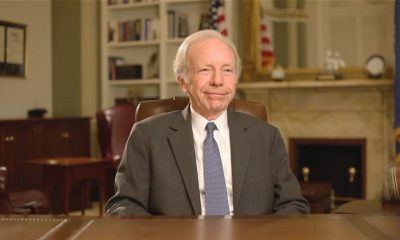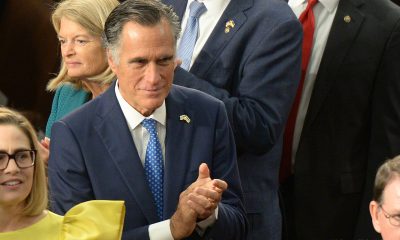National
Mormon leader’s lesbian descendant running for Congress
Claudia Wright forces runoff against five-term incumbent

The lesbian great, great granddaughter of an early leader of the Mormon Church is attracting LGBT support in her bid to represent Utah in Congress.
In what could be an uphill battle, Claudia Wright, a retired high school teacher, is seeking to steal the Democratic nomination from five-term incumbent Rep. Jim Matheson (D-Utah) in a primary election set for June 22.
Wright said she pursued a run against Matheson because she was displeased with his opposition to health care reform legislation, and doesn’t think he is accurately representing voters in the congressional district.
“As this became a gerrymandered district, his attitude was he’d have to move further to the right, but he’s now further to the right — especially on things like health care — he’s now further to the right than [Republican Sen. Bob] Bennett was,” Wright said. “I think he’s too far to the right to represent most of Utah.”
Wright forced a runoff in the race after Matheson failed to secure 60 percent of the vote from delegates at the Utah State Democratic Convention on May 8. Matheson received 55 percent of the vote; Wright received 45 percent.
This marks the first time Matheson hasn’t received enough support from delegates and has faced a primary runoff, according to the Utah-based Deseret News.
Wright said she believes she can beat Matheson in the primary because she’s focusing on issues of concern to Democrats and Republicans. She cited as two priorities public financing of campaigns and reform eliminating “too big to fail” safeguards for banks.
“I think that does appeal to moderates, and I think it does appeal to independents,” she said. “So I think I have a really good shot at perhaps getting the nomination and also winning in the fall.”
An out lesbian, Wright has been in a relationship for 13 years with Stephanie Pace, a retired college professor.
Wright said she has a limited portfolio in LGBT activism, but she contributed to the Utah Pride Center when it first opened in Salt Lake City and is a member of the Human Rights Campaign. She’s received support from a number of LGBT groups and associations within Utah, including an endorsement from the Stonewall Democrats of Utah Caucus.
Bruce Bastian, a gay billionaire philanthropist known for supporting many LGBT organizations, also has thrown his support behind Wright.
Wright has the distinction of being the great, great granddaughter of Brigham Young, an early leader of the Church of Latter-day Saints. He became church president in 1847. Wright said while that lineage may be impressive to people who live outside of Utah, “it’s not unusual” among people within the state because Young was known to have 55 wives and many descendants.
“So about every fourth person in the state is Brigham Young’s descendant,” she said. “Outside of the state, that sounds like a really big deal; inside of the state, it doesn’t get you very far.”
Wright, who said she was a Mormon but now doesn’t belong to any organized religion, is critical of the Mormon Church’s tenet that “sexuality is entirely choice.”
The church is recognized as having played a significant role in backing anti-gay initiatives, most notably Proposition 8, which ended same-sex marriage in California in 2008.
“I felt very out of place, first, as a single women, and then, as a lesbian, later on in the church,” she said. “I haven’t been an active member of the LDS Church in over 20 years.”
Still, Wright said she doesn’t “have any animosity” and that members of both sides of her family subscribe to the Mormon faith.
“I think eventually they’ll have to come around — just like the Catholic Church will, the Baptist Church will, and the Methodist Church will over time,” she said. “And they will. They’ll come to understand the issue better.”
Matheson is known for having a mixed voting record on LGBT issues during his tenure in Congress. He voted in favor of the Federal Marriage Amendment in 2004 and 2006.
The lawmaker voted in favor of hate crimes legislation and a version of the Employment Non-Discrimination Act in 2007, but he also voted in favor of a motion of recommit to kill ENDA.
Still, Matheson was vocal in his support last week for legislation to repeal “Don’t Ask, Don’t Tell.” Before voting in favor of the measure, he spoke on the House floor in support of it.
“Anyone who’s willing to put on this country’s uniform and put his or her life on the line to protect our freedoms deserves our respect and should not be subject to discrimination,” he said. “Repealing this flawed policy is an important way for us to show that respect.”
But Wright said she considers Matheson’s vote on the matter — as well as his co-sponsorship of an environmental bill — a way to appease more liberal voices in his district.
“He is trying to win back some of the environmentalists that endorsed me and he’s trying to do the same thing with the LGBT community,” she said. “I think he’s having limited success with both of those.”
Overtaking Matheson in the primary could be a challenge for Wright as his financial resources dwarf the amount she’s raised. According to the most recent Federal Election Commission reports, Matheson had more than $1.4 million in cash on hand, while Wright had about $9,000.
Wright dismissed the funding disparity, saying she’s “running a very different campaign” from Matheson.
She said “a lot of people” are working for her campaign across the state on a volunteer basis and would support her plans to go “town by town, county by county through the state” to compete with Matheson on the grassroots level.
“I can’t compete with him in money,” she said. “He’s always going to be able to afford more ads on TV and more ads on the radio, and I hope to do this person to person.”
National
Same-sex couples vulnerable to adverse effects of climate change
Williams Institute report based on Census, federal agencies

A new report by the Williams Institute at the UCLA School of Law finds that same-sex couples are at greater risk of experiencing the adverse effects of climate change compared to different-sex couples.
LGBTQ people in same-sex couple households disproportionately live in coastal areas and cities and areas with poorer infrastructure and less access to resources, making them more vulnerable to climate hazards.
Using U.S. Census data and climate risk assessment data from NASA and the Federal Emergency Management Agency, researchers conducted a geographic analysis to assess the climate risk impacting same-sex couples. NASA’s risk assessment focuses on changes to meteorological patterns, infrastructure and built environment, and the presence of at-risk populations. FEMA’s assessment focuses on changes in the occurrence of severe weather events, accounting for at-risk populations, the availability of services, and access to resources.
Results show counties with a higher proportion of same-sex couples are, on average, at increased risk from environmental, infrastructure, and social vulnerabilities due to climate change.
“Given the disparate impact of climate change on LGBTQ populations, climate change policies, including disaster preparedness, response, and recovery plans, must address the specific needs and vulnerabilities facing LGBTQ people,” said study co-author Ari Shaw, senior fellow and director of international programs at the Williams Institute. “Policies should focus on mitigating discriminatory housing and urban development practices, making shelters safe spaces for LGBT people, and ensuring that relief aid reaches displaced LGBTQ individuals and families.”
“Factors underlying the geographic vulnerability are crucial to understanding why same-sex couples are threatened by climate change and whether the findings in our study apply to the broader LGBTQ population,” said study co-author Lindsay Mahowald, research data analyst at the Williams Institute. “More research is needed to examine how disparities in housing, employment, and health care among LGBT people compound the geographic vulnerabilities to climate change.”
Read the report
Federal Government
Lambda Legal praises Biden-Harris administration’s finalized Title IX regulations
New rules to take effect Aug. 1

The Biden-Harris administration’s revised Title IX policy “protects LGBTQ+ students from discrimination and other abuse,” Lambda Legal said in a statement praising the U.S. Department of Education’s issuance of the final rule on Friday.
Slated to take effect on Aug. 1, the new regulations constitute an expansion of the 1972 Title IX civil rights law, which prohibits sex-based discrimination in education programs that receive federal funding.
Pursuant to the U.S. Supreme Court’s ruling in the landmark 2020 Bostock v. Clayton County case, the department’s revised policy clarifies that discrimination on the basis of sexual orientation and gender identity constitutes sex-based discrimination as defined under the law.
“These regulations make it crystal clear that everyone can access schools that are safe, welcoming and that respect their rights,” Education Secretary Miguel Cardona said during a call with reporters on Thursday.
While the new rule does not provide guidance on whether schools must allow transgender students to play on sports teams corresponding with their gender identity to comply with Title IX, the question is addressed in a separate rule proposed by the agency in April.
The administration’s new policy also reverses some Trump-era Title IX rules governing how schools must respond to reports of sexual harassment and sexual assault, which were widely seen as imbalanced in favor of the accused.
Jennifer Klein, the director of the White House Gender Policy Council, said during Thursday’s call that the department sought to strike a balance with respect to these issues, “reaffirming our longstanding commitment to fundamental fairness.”
“We applaud the Biden administration’s action to rescind the legally unsound, cruel, and dangerous sexual harassment and assault rule of the previous administration,” Lambda Legal Nonbinary and Transgender Rights Project Director Sasha Buchert said in the group’s statement on Friday.
“Today’s rule instead appropriately underscores that Title IX’s civil rights protections clearly cover LGBTQ+ students, as well as survivors and pregnant and parenting students across race and gender identity,” she said. “Schools must be places where students can learn and thrive free of harassment, discrimination, and other abuse.”
Michigan
Mich. Democrats spar over LGBTQ-inclusive hate crimes law
Lawmakers disagree on just what kind of statute to pass

Michigan could soon become the latest state to pass an LGBTQ-inclusive hate crime law, but the state’s Democratic lawmakers disagree on just what kind of law they should pass.
Currently, Michigan’s Ethnic Intimidation Act only offers limited protections to victims of crime motivated by their “race, color, religion, gender, or national origin.” Bills proposed by Democratic lawmakers expand the list to include “actual or perceived race, color, religion, gender, sexual orientation, gender identity or expression, ethnicity, physical or mental disability, age, national origin, or association or affiliation with any such individuals.”
Democratic Gov. Gretchen Whitmer and Attorney General Dana Nessel have both advocated for a hate crime law, but house and senate Democrats have each passed different hate crimes packages, and Nessel has blasted both as being too weak.
Under the house proposal that passed last year (House Bill 4474), a first offense would be punishable with a $2,000 fine, up to two years in prison, or both. Penalties double for a second offense, and if a gun or other dangerous weapons is involved, the maximum penalty is six years in prison and a fine of $7,500.
But that proposal stalled when it reached the senate, after far-right news outlets and Fox News reported misinformation that the bill only protected LGBTQ people and would make misgendering a trans person a crime. State Rep. Noah Arbit, the bill’s sponsor, was also made the subject of a recall effort, which ultimately failed.
Arbit submitted a new version of the bill (House Bill 5288) that added sections clarifying that misgendering a person, “intentionally or unintentionally” is not a hate crime, although the latest version (House Bill 5400) of the bill omits this language.
That bill has since stalled in a house committee, in part because the Democrats lost their house majority last November, when two Democratic representatives resigned after being elected mayors. The Democrats regained their house majority last night by winning two special elections.
Meanwhile, the senate passed a different package of hate crime bills sponsored by state Sen. Sylvia Santana (Senate Bill 600) in March that includes much lighter sentences, as well as a clause ensuring that misgendering a person is not a hate crime.
Under the senate bill, if the first offense is only a threat, it would be a misdemeanor punishable by one year in prison and up to $1,000 fine. A subsequent offense or first violent hate crime, including stalking, would be a felony that attracts double the punishment.
Multiple calls and emails from the Washington Blade to both Arbit and Santana requesting comment on the bills for this story went unanswered.
The attorney general’s office sent a statement to the Blade supporting stronger hate crime legislation.
“As a career prosecutor, [Nessel] has seen firsthand how the state’s weak Ethnic Intimidation Act (not updated since the late 1980’s) does not allow for meaningful law enforcement and court intervention before threats become violent and deadly, nor does it consider significant bases for bias. It is our hope that the legislature will pass robust, much-needed updates to this statute,” the statement says.
But Nessel, who has herself been the victim of racially motivated threats, has also blasted all of the bills presented by Democrats as not going far enough.
“Two years is nothing … Why not just give them a parking ticket?” Nessel told Bridge Michigan.
Nessel blames a bizarre alliance far-right and far-left forces that have doomed tougher laws.
“You have this confluence of forces on the far right … this insistence that the First Amendment protects this language, or that the Second Amendment protects the ability to possess firearms under almost any and all circumstances,” Nessel said. “But then you also have the far left that argues basically no one should go to jail or prison for any offense ever.”
The legislature did manage to pass an “institutional desecration” law last year that penalizes hate-motivated vandalism to churches, schools, museums, and community centers, and is LGBTQ-inclusive.
According to data from the U.S. Department of Justice, reported hate crime incidents have been skyrocketing, with attacks motivated by sexual orientation surging by 70 percent from 2020 to 2022, the last year for which data is available.
Twenty-two states, D.C., Puerto Rico, and the U.S. Virgin Islands have passed LGBTQ-inclusive hate crime laws. Another 11 states have hate crime laws that include protections for “sexual orientation” but not “gender identity.”
Michigan Democrats have advanced several key LGBTQ rights priorities since they took unified control of the legislature in 2023. A long-stalled comprehensive anti-discrimination law was passed last year, as did a conversion therapy ban. Last month the legislature updated family law to make surrogacy easier for all couples, including same-sex couples.
A bill to ban the “gay panic” defense has passed the state house and was due for a Senate committee hearing on Wednesday.
-

 District of Columbia4 days ago
District of Columbia4 days agoNew D.C. LGBTQ+ bar Crush set to open April 19
-

 District of Columbia5 days ago
District of Columbia5 days agoReenactment of first gay rights picket at White House draws interest of tourists
-

 Arizona5 days ago
Arizona5 days agoAriz. governor vetoes anti-transgender, Ten Commandments bill
-

 South America3 days ago
South America3 days agoDaniel Zamudio murderer’s parole request denied












